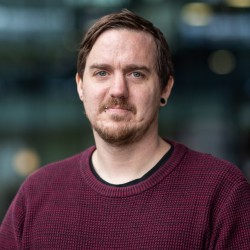
Ga voor actuele informatie en nieuws naar onze vernieuwde website.
Post-quantum cryptography
Speaker: Andreas Hülsing
Abstract
As soon as large scale quantum computers are built today's cryptography does not provide security anymore. This threatens the security of our digital society. Even worse: For some data that we send or store in encrypted form we want secrecy to hold for our whole lifetime, if not longer. Think of medical data for example. This data can be stored and decrypted when a quantum computer is available.
Post-quantum cryptography is the study of conventional cryptography in the presence of an adversary with access to a quantum computer. In this talk I will give an overview of the landscape of schemes submitted to the recent NIST standardization project. I will discuss the underlying problems and summarize the current knowledge about quantum algorithms to solve them.
In addition, I will touch on challenges in the area of provable post-quantum security.
Biography

I am assistant professor in the Coding Theory and Cryptology group at Eindhoven University of Technology (TU/e). My research focuses on post-quantum cryptography — cryptography that resists quantum computer-aided attacks. My works range from theoretical works, like how to model quantum attacks or formal security arguments in post-quantum security models, to applied works, like the analysis of side-channel attacks or the development of efficient hash-based signature schemes. In many of my works I try to combine the theoretical and the applied perspective. This is especially reflected in my work on standardizing post-quantum cryptography.
Before my current position, I was a postdoctoral researcher in the Coding Theory and Cryptology group, working with Tanja Lange in the PQCRYPTO project. Before I was a postdoctoral researcher in the cryptographic implementations group at TU/e, working with Daniel J. Bernstein. I did my PhD in the cryptography and computer algebra group at TU Darmstadt under the supervision of Johannes Buchmann.
Before starting my PhD, I worked as a research fellow at Fraunhofer SIT in Darmstadt. I hold a Diploma in computer science from TU Darmstadt.
Twitter: @cr_yp_to
najaar 2019
- Overzicht
Aanmelden- Programma
- Locatie
- Publicaties
| Vereniging NLUUG info@nluug.nl |
postbus 8189 6710 AD Ede |